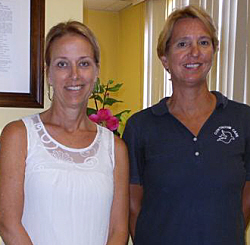
Matthewson, a registered nurse, is administrator of Continuum Care, Inc. Worth is a registered social worker on St. Thomas and St. John, where CCI has a small staff. They work hand in glove, or as Worth jokes, "joined at the hip.”
At the center of hospice care is the belief that each person has the right to die pain-free and with dignity, and that the person’s family will receive the support it needs.
CCI started on St. Croix in 2000, and its services were expanded to St. Thomas and St. John in February 2004. The two are the backbone of the St. Thomas office, with between 50 and 60 patients on St. Thomas.
"The patient is our boss," Matthewson says. "It’s not about how long the patient expects to live. It’s about their quality of life. We care for the patient and the family from admission until death," she says.
"It’s an educational process to let family members know what to expect. We provide care 24/7 as needed. A hospice nurse is always available by phone."
There is no hospice facility. The care is provided in the patient’s home by a relatively small staff of registered nurses, certified aides, occasional volunteers, and a staff physician.
Continuum Care was founded in 2000 by Tracy Sanders, who moved to the territory in 1995 with her husband, Dr. Herb Sanders. A registered nurse for more than 30 years, Sanders was chief operating officer for the largest home independent home care and hospice company in Georgia before starting CCI on St. Croix.
Matthewson and Worth are the first to visit patients that have been referred to the hospice to determine their eligibility. Medicare (and some other insurers) require certification that a patient has a "life expectancy of six months or less if the disease runs its normal course."
"We have to take a medical history of the patient," Matthewson says. "However, we need a doctor’s authorization to proceed with care."
Normally, patients have a life expectancy of six months or less, Matthewson says. "It’s an expectancy of weeks or months, not years."
Most patients are covered by Medicare, which provides equipment like wheelchairs, oxygen, as well as covering medications, which must be ordered by the patient’s physician. "Medicare is our other boss," Matthewson notes.
The hospice also provides grief and loss counseling, talking with families about, for instance, anger, denial and acceptance, as well as having a spiritual counselor on call, along with bereavement counseling.
Roy L. Schneider Hospital neurologist Dr. David Weisher is the hospice medical director. Along with Matthewson and Worth, he visits patients every Friday.
In an interview earlier this year, Weisher spoke of the satisfaction he takes from helping others. "You become a member of the family when you help someone," he said. "The older folks in the community are those I enjoy most."
Crucial to the patient’s care are advance directives, legal documents that speak for the patient in the event of incapacity: a living will, which instructs on how the patient’s wished about medical treatment at the end of live, and a medical power of attorney which appoints a person to carry out those wishes.
"It is a huge part of our evaluation," Matthewson says. "Even if the patient can’t do it in writing, they can verbally tell their wishes to another person they choose."
However, it’s important to talk with the patient and family members so they understand the procedures. "That’s where communication comes in," she says. "We don’t want any surprises."
Hospice is in effect like a soothing blanket, a helping hand to guide people over very trying times. It calls for an unusual amount of tact, skill and compassion.
It would seem not becoming attached to a patient or family members, while providing emotional support, could be challenging. Speaking from experience, Worth gives a compassionate and eminently reasonable answer. "You have to set boundaries," she says, "or you are lost."
Patients are referred by their doctor, family members, the Department of Human Services, or the Schneider Regional Medical Center. Anyone can refer a patient. "The hospital does a very good job of keeping us informed. We have a very good relationship with the hospital and with Human Services,"
Though almost all older patients are covered by Medicare, sometimes there is a younger patient without financial means. "We will not turn anyone away," Matthewson says. The hospice works with Cancer Support V.I. and AARP, for which CCI founder Tracy Sanders is the state grief and loss coordinator.
One thing the hospice needs is more volunteers, Matthewson and Worth stress. "And we need to get the word out, that we are here," Worth says.
To make a referral or volunteer, call 714-2273.





